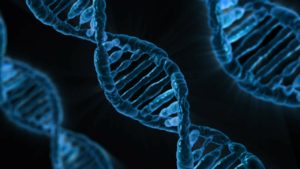Depression is a huge issue across the United States. The National Institute of Mental Health estimates that some 5-12 percent of the entire population will experience a major depressive episode in any given year. A major depressive episode can be absolutely crippling and can leave the sufferer completely unable to function. Thus, depression will often have a severely adverse effect on the person’s work life, not to mention their personal relationships.
What causes depression, and where does it come from?
 Due to the complex biological nature of our minds, it is incredibly difficult to define exactly where depression originates. Psychologists have been asking this exact question for years without a completely comprehensive answer.
Due to the complex biological nature of our minds, it is incredibly difficult to define exactly where depression originates. Psychologists have been asking this exact question for years without a completely comprehensive answer.
Due to the subjective nature of depression as an illness, one person’s personal experience of a depressive episode may be very different from that of another. Therefore, discovering a generic cause is almost impossible.
What are the different types of depression?
There are several different types of depression. Within the classification of a “Major Depressive Disorder,” there are several subcategories that professionals use to define the particular type of illness. These classifications will take into account aspects such as the severity of the condition, the presence of psychotic symptoms and whether or not the episodes tend to run in cycles.
A major depressive episode, however, will always last for a period of at least two weeks and will include a depressed mood or lack of motivation.
Another lesser-known form of depression is “dysthymia.” This condition is a longer term, usually less severe form of depression. However, this form of depression can continue for years without easing up, and while the severity may not be as bad at any given moment, the chronic nature of dysthymia can be incredibly wearing.
 Depression can also be explained as an adjustment disorder – a reactive mood in response to negative life events. For example, losing your job, grieving the loss of a loved one, or making a poor financial decision – all these things are known to have triggered depression.
Depression can also be explained as an adjustment disorder – a reactive mood in response to negative life events. For example, losing your job, grieving the loss of a loved one, or making a poor financial decision – all these things are known to have triggered depression.
Finally, there is bipolar depression, which is often experienced as an alternating between depressed low mood and exceedingly high moods. These highs, sometimes referred to as mania, may feel incredible, but can often cause destructive actions over time.
Of course, depression can easily fit into a lot of different diagnostic boxes. However, in general, the common thread running through each of them is an extended period of sadness and lack of motivation. Sometimes, there is no obvious reason for this change of mood and shift in brain chemistry – this is why depression can be so difficult to treat.
Possible Causes of Depression
Research has shown that it is possible to explain the causes behind a depressive episode. Let’s take a closer look at some of these.
1. Neurotransmitters
Neurons are the cells found in the brain and body that communicate information, not too dissimilar to a modern computer. When neurons fire, they cause us to experience thoughts, emotions, and memories. Thus, they also affect our mood.
We know for a fact that when serotonin (a neurotransmitter) is plentiful in our brain system, our mood tends to increase. Other neurotransmitters, such as dopamine, cause similar effects. Antidepressant medication seeks to level create a healthier balance in our brain chemistry, increasing the general level of our mood.
With that being said, the brain is an organ of extraordinary complexity. Due to the individual make-up of our brain chemistry, certain antidepressants will work better for some, and be less effective for others.
Therefore, discovering the right antidepressant can be quite a long and frustrating task. With that in mind, it is important to note that simple things like improving your diet and increasing your level of exercise can greatly improve your mood.
2. Genes
Our individual genetics can play a significant role in the onset of depression. If you have a family member with depression, specifically a parent or sibling, you are much more likely to suffer from the condition yourself. Some people are genetically predisposed to struggle with low mood and depression.
 When the genes for depression are passed on, they affect the way in which your brain develops and interacts with your neurotransmitters.
When the genes for depression are passed on, they affect the way in which your brain develops and interacts with your neurotransmitters.
That being said, you cannot assume that the relatives of a depressed person will develop the condition themselves. Indeed, someone can develop depression without any family history whatsoever. Genetics increase the probability of suffering from depression but are not a direct cause.
3. Environment
While genetics are important, it is also crucial to consider a person’s environment. For example, someone with a genetic predisposition to depression may be highly susceptible to low mood, but may only develop a major depressive episode when their environmental conditions become detrimental to their mental health – such as experiencing tragedy, economic hardship or loss.
Simpler environmental factors could even include things such as the weather. Typically, those who move somewhere that enjoys plenty of sunshine to a place with a rainier climate are more likely to become susceptible to a depressive episode.
In addition to this, a constant, long-term oppression can naturally lead someone to become depressed, at least for a season – no one is exempt from falling victim to this type of situation.
4. Anemia
Anemia can cause a person to feel very low in energy, which can, in turn, lead to a severe lack of motivation and can, therefore, result in a vicious circle of depressive mood. The issue, however, is very physical – anemia is caused by a deficiency of iron in the blood that carries oxygen to the organs.
This condition can result in symptoms very similar to depression – but regular antidepressants are unlikely to help, increasing the frustration of the sufferer. If this appears to be your situation, it is always worth asking for a blood test to rule out anemia.
5. Spirituality
It can be a dangerous thing to talk about spirituality in the same sentence as issues of mental health. Too often, unhelpful assertions are made about a lack of faith being the cause of a deep depression.
Others have been known to blame sin for all depressive tendencies — this is simply not true. That being said, as Christians, we must understand the reality of the spiritual world – that we are in a constant battle between darkness and light.
Indeed, when depression sets in, it can be easy to withdraw from the Church community. But that is the last thing a depressed person should do. The health and warmth of a loving Christian community can really help someone who is going through the darkness of depression.
We must also know that God has a hand in our physical being. He made us, and He has the power to heal us. So, we should pray for those with depression. We must never tire of praying for spiritual and emotional well being, alongside engaging in the necessary treatments and therapies.
Treatment for Depression
 Depression can be a terrifying experience and often involves a vast array of factors that contribute to its development. As we have explored, causes can be extremely varied. Therefore, treatment methods should also be diverse in order to effectively treat the specific condition. In a broader sense, research shows that the most fruitful way of treating depression is through a combination of medication and therapy.
Depression can be a terrifying experience and often involves a vast array of factors that contribute to its development. As we have explored, causes can be extremely varied. Therefore, treatment methods should also be diverse in order to effectively treat the specific condition. In a broader sense, research shows that the most fruitful way of treating depression is through a combination of medication and therapy.
Medication can be a great help in assisting the sufferer with their recovery, and it works best when accompanied by other forms of therapy such as counseling. Going to therapy is a great first step, and shows that you are serious about dealing with your mental health issues.
A therapist is likely to help you identify the key areas in your life that you can work on to see your mental health improve. They may also help you to identify unhealthy thought patterns or self-deprecating assumptions that are having a detrimental effect on your mental health.
Talking through your struggles can be incredibly helpful, and may give you an unexpected insight into your condition. Then, you may be referred to a psychiatrist who will help decipher your medication requirements. With the right combination of these two methods of treatment, you can develop the tools required to manage and alleviate your depression, and can place yourself firmly on the road to recovery.
“Depressed”, Courtesy of Alex Boyd, Unsplash.com, CC0 License; “Down”, Courtesy of Ethan Sykes, Unsplash.com, CC0 License; “DNA”, Courtesy of PublicDomainPictures, Pixabay.com, CC0 License; “Bible”, Courtesy of Aaron Burden, Unsplash.com, CC0 License
-
Kate Motaung: Curator
Kate Motaung is the Senior Writer, Editor, and Content Manager for a multi-state company. She is the author of several books including Letters to Grief, 101 Prayers for Comfort in Difficult Times, and A Place to Land: A Story of Longing and Belonging...





